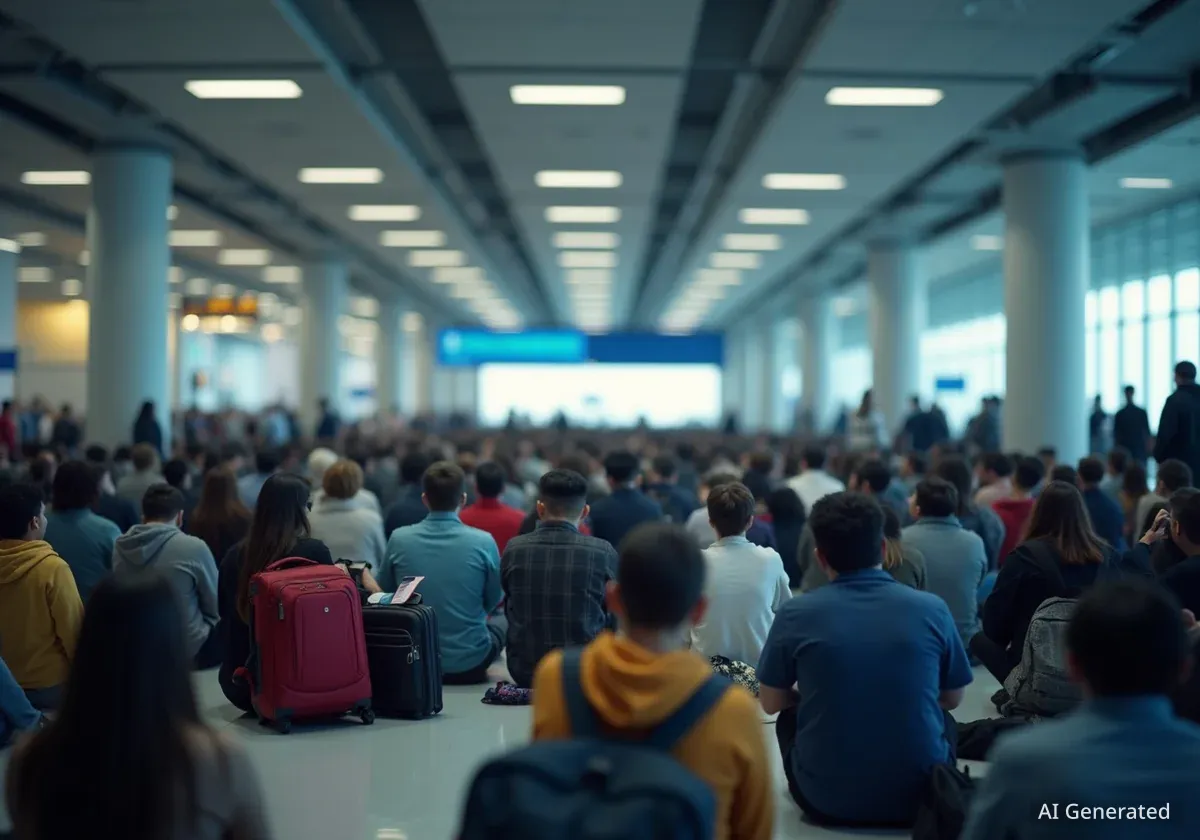Hundreds of flights were canceled and thousands of travelers faced significant delays at Dallas-Fort Worth International Airport (DFW) and Dallas Love Field on Friday. A major telecommunications outage led federal officials to halt air traffic, causing widespread disruption across the region.
The incident highlighted vulnerabilities within the U.S. aviation system. A single technical failure can ground numerous flights, impacting travel nationwide. This raises questions about the country's air traffic infrastructure, especially with current high travel demand.
Key Takeaways
- Nearly 1,800 flights were delayed and hundreds canceled on Friday.
- A local telephone company equipment issue caused the outage, not FAA equipment.
- Both DFW and Dallas Love Field were significantly impacted.
- Major airlines like American and Southwest experienced extensive disruptions.
- The incident adds to ongoing concerns about aging air traffic control infrastructure.
Telecommunications Issue Halts Flights
The Federal Aviation Administration (FAA) confirmed that a "local telephone company equipment issue" was responsible for disrupting air traffic systems. This problem forced the agency to slow and then stop flights into Dallas airports.
The FAA clarified that its own equipment was not involved in the outage. However, the failure of an external telecommunications provider had a direct impact on critical air traffic control operations.
Both Dallas-Fort Worth International Airport (DFW) and Dallas Love Field, two of the nation's busiest airports, were affected. The disruptions began on Friday morning and continued throughout the day.
Important Statistic
By late Friday afternoon, FlightAware data showed nearly 1,800 flights delayed and hundreds canceled across the affected airports. DFW alone saw approximately 700 delays and 200 cancellations.
Impact on Major Airlines
American Airlines, which operates its largest hub at DFW, reported significant operational challenges. The carrier canceled over 200 flights and delayed more than 500. This affected roughly 25 percent of its scheduled operations for the day.
Southwest Airlines also experienced extensive disruptions. The airline reported more than 1,100 delays, representing 27 percent of its flights. Passengers faced long waits at terminals and on grounded aircraft.
"The FAA is working with the telephone company to determine the cause," the agency stated, indicating efforts to resolve the issue swiftly.
Passenger Experiences and Ripple Effects
The widespread flight cancellations and delays left thousands of passengers stranded. Many travelers missed important events, business meetings, or family gatherings. The impact extended beyond Dallas, creating cascading disruptions at other airports nationwide.
A traveler from Allen, Texas, shared her disappointment with CBS News. She had planned to visit her son in the military in Florida, a trip she would now miss.
"I haven't seen him in about 10 months," she said. "Sadly, all the flights tomorrow are booked also, so I'll be missing my weekend with him."
Another passenger, from Columbus, Ohio, described a seven-hour ordeal during her first solo flight. Her plane was rerouted to Oklahoma due to the outage.
"It was supposed to be a two-and-a-half-hour flight," she told CBS News. "People were annoyed. Some almost drove home."
Broader Context: Aviation Infrastructure Concerns
This incident adds to a series of technical and staffing challenges faced by the FAA recently. Only a day earlier, flights into Denver International Airport were slowed due to automation problems requiring manual air traffic controller handoffs.
Congress recently approved $12.5 billion to modernize the nation's air traffic control network. FAA leaders have acknowledged that the system experiences "tech issues almost every day."
Public concern has also grown over near-miss incidents, staffing shortages, and a serious January crash involving an American Airlines jet and a U.S. Army helicopter.
Airport Responses and Ongoing Situation
DFW Airport confirmed that the FAA lifted the ground stop later on Friday night. However, airport officials advised passengers to continue checking with their airlines for updated flight status information.
Dallas Love Field Airport also issued a statement regarding the situation. A spokesperson indicated that the airport did not have a definite resolution time for the outage.
- DFW Airport: Ground stop lifted, but delays persisted.
- Dallas Love Field: No definite resolution time provided, passenger safety is top priority.
- Advice to Travelers: Always check directly with your airline for the most current flight information and accommodation options.
As of Saturday morning, flights had resumed, though residual delays were expected to continue. The full extent of the financial and logistical impact on airlines and passengers is still being assessed.
Future Outlook for Air Travel
The incident underscores the critical need for resilient infrastructure in the aviation sector. As travel demand continues to grow, reliable telecommunications and air traffic control systems are essential to prevent widespread disruptions.
The ongoing investments in modernizing air traffic control aim to address these vulnerabilities. However, the recent events highlight that challenges remain in ensuring seamless and consistent air travel operations across the country.





